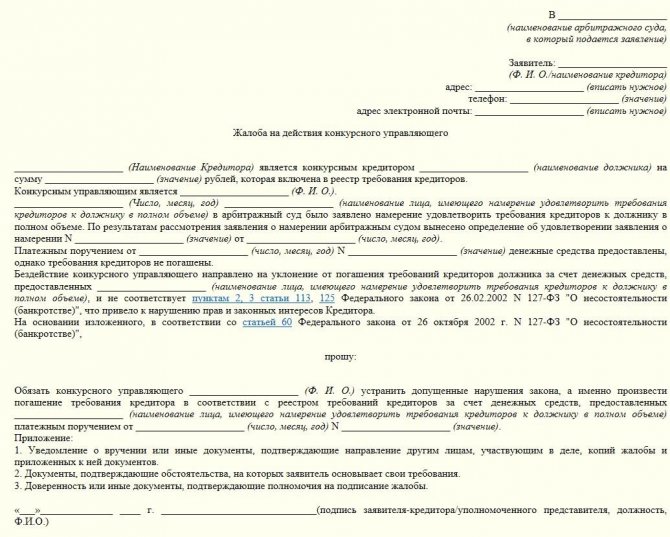Bankruptcy litigation is a complex undertaking, during which the bankruptcy trustee plays a prominent role. The interests of all participants in the procedure are not always respected, therefore each representative of the case has the right to appeal an infringing action or decision. But in order to obtain a positive decision, it is important to strictly follow the procedure in which a complaint against the bankruptcy trustee is filed with the arbitration court and what requirements are imposed on the content of this document.
Arbitration manager
Before directly understanding the concept of “arbitration manager”, it is necessary to outline what the arbitration court does. The cases that are carried out there usually relate to business activities and everything that may be connected with it.
Their scope of activity includes such litigation as resolving economic public disputes, protecting the rights of entrepreneurs, establishing international communications, resolving business disputes and similar cases as previously listed.
Accordingly, the arbitration court, whose field of activity is quite extensive, has its own specific structure and activities. And here we come close to the concept of an arbitration manager.
In short, this specialist is the person who directly supervises the case of recognizing the bankruptcy status of an enterprise.
There are quite a lot of such cases. And this representative of the court exercises constant control over the company that came under the jurisdiction of the court.
That is, let’s say some enterprise declares bankruptcy, and the arbitration court begins to consider this issue. During the trial, the court appoints a specialist who will take the post of temporary manager in the mentioned company.
Over a certain period of time, he will have to find out whether it is possible to somehow improve the financial situation of the institution, what actions will be needed for this, and so on.
The manager monitors the work of the establishment, deals with the requirements of creditors who provided funds for the operation of the enterprise, and draws up an optimal schedule for their implementation.
Also, the arbitration manager has all the powers to dismiss employees, as well as dispose of the property of the enterprise. Exclusively for the purpose of restoring the financial viability of the enterprise. This is considered an expanded range of powers, and such a manager is considered to be in bankruptcy.
In turn, the actions and decisions of this specialist are controlled by the SRO - a self-regulatory organization of arbitration managers, as well as the arbitration court.
Manager functions
At different stages of the procedure for declaring a debtor insolvent, the administrator performs specific duties outlined by Law No. 127-FZ. The main purpose of the authorized person is to analyze and control the financial position of the enterprise, ensuring the maximum possible fulfillment of the claims of creditors.
The manager is authorized to:
- Organize a collegial meeting of creditors.
- Prepare written requests to the arbitration court (petition, appeal, application, etc.).
- Hire third parties to carry out bankruptcy measures with payment for services provided at the expense of the defendant.
- Receive unhindered access to a set of information about the financial and economic activities of the company, and submit requests to the bank.
- Initiate suspension from fulfillment of obligations in this case.
Persons engaged by the manager to assist in the fulfillment of obligations must have appropriate accreditation. The deadline for providing information by counterparties, regulatory authorities, and citizens interacting with a bankrupt organization is a week. Information is provided free of charge.
Let us define the main responsibilities of the arbitration manager:
- ensuring the integrity of the debtor’s property, conducting an inventory;
- detailed diagnostics of entrepreneurial activity;
- manage the creation and maintenance of a register of claims, providing it at the request of the participants in the case;
- report to the competent authority about identified administrative violations;
- organize informing creditors about contracts and transactions in which civil liability of third parties arises;
- spend funds exclusively for their intended purpose;
- identify artificially created factors that influenced the decline in the company’s payment function, and report this to arbitration, etc.
An arbitration manager replaces the management of an enterprise that has declared bankruptcy
When can you file a complaint?
The temporary manager must satisfy the interests of two parties at once: creditors and the enterprise, and both the first and second representatives of the parties can file a complaint against him . This is stipulated in the Federal Law, No. 127-FZ “On Insolvency and Bankruptcy”.
Creditors may go to court due to a specialist’s violation and failure to satisfy legitimate interests. The co-founders of the enterprise can also do this. A representative of the institution’s employees can also file a petition if they, in turn, suffered damage to life or health.
Since a specialist sent by the SRO is empowered to manage all the finances and property of the company, he also oversees such matters as the payment of severance pay or wages to employees of the establishment. If these points are neglected by a specialist, a representative of the work team has the right to file a complaint against him.
Also, a complaint against the temporary manager can be filed in court by one of the co-founders if a third party has appeared in the case who is ready to urgently pay the debts of the enterprise, and the arbitration specialist for some reason refuses to make a deal, that is, does not fulfill his duties .
Addressee of the complaint against the bankruptcy administrator
The highest authority for exercising control over the activities of the manager is the arbitration court. It is to him that written complaints about violations of the procedure for fulfilling obligations and the commission of illegal actions by the bankruptcy manager should be addressed.
The appointment of a manager to a position and the termination of his powers occurs exclusively by decision of arbitration. Creditors, a representative of the defendant, and other participants in the trial can initiate the removal of a citizen. Employees of the company have the right to file a complaint on the basis of clause 11 of article 16 of Federal Law No. 127.
The application must be drawn up by a participant in the bankruptcy case in compliance with all requirements of current legislation. There is no state fee. The consideration of the complaint takes place within a month after the document is registered in the incoming correspondence of the court. A prerequisite is the provision of evidence.
In addition to applying to arbitration, participants in the process can complain to the prosecutor's office, law enforcement agencies, self-regulatory organizations and other competent authorities. The decision where to file an appeal depends on the basis and opinion of the applicant.
By turning to the SRO, you can achieve disciplinary punishment for the manager and disqualification of the citizen. Filing an application to the Federal Tax Service will help challenge the fictitious acts of the debtor and the concealment of such processes by the administrator. Illegal actions of persons are punishable by criminal liability. A complaint filed with Rosreestr about the illegal actions of the bankruptcy manager will be considered in court at the initiative of the authority and may lead to deprivation of the license, removal of the manager, or the imposition of an administrative penalty.
The decision of the addressee of the complaint is subject to appeal by the applicant within the time limits established by law.
Where can you file a complaint?
There are several authorities to which you can file a complaint against an arbitration specialist. But, first of all, of course, you should contact the arbitration court. In addition to it, you can also submit an application to law enforcement agencies or the Federal Tax Service. It is possible to contact the SRO that provided this specialist.
Now let’s take a closer look at each of the instances.
The arbitration court is actually overwhelmed with cases of bankruptcy of enterprises , so you should once again make sure that your complaint against the bankruptcy trustee to the arbitration court is drawn up clearly according to the requirements that it provides, or the case will not proceed at all and will not be considered. If the petition is drawn up correctly, the court sets a date for the trial.
Law enforcement agencies bring the specialist against whom the application was filed to administrative liability. In most cases, the state registry opens a case if the application is filed by a representative of creditors or government agencies.
The registry leaves the examination of other precedents to the self-regulatory organization; moreover, the case is not always resolved in a short period of time; the proceedings can be significantly delayed.
The Federal Tax Service is another authority that deals with bankruptcy proceedings. It makes sense to contact the tax office if a representative of an SRO temporarily occupying a management position has been recorded for actions that may be considered a takeover of an organization or a violation of the interests of creditors.
The SRO, as mentioned earlier, is obliged to monitor the performance of the proper duties of its employees. Each self-regulatory organization has its own documents and acts, drawn up in accordance with the Federal Law, and which regulate the activities of specialists who are members of these organizations.
Before contacting the SRO with your complaint, you should carefully read these documents and clarify whether the appealed actions of the temporary manager are incompetent or unlawful.
How to submit a document
In order to protect the rights and interests, bankruptcy creditors (authorized bodies) have the right to appeal to the arbitration court with a complaint against the actions of the arbitration manager.
In accordance with Part 1 of Article 60 of the Federal Law of October 26, 2002 N 127-FZ “On Insolvency (Bankruptcy),” complaints from creditors about violations of their rights and legitimate interests are considered at a meeting of the arbitration court no later than a month from the date of receipt of the specified statements, petitions and complaints, unless otherwise provided by Federal Law.
https://www.youtube.com/watch{q}v=dfqHKuvsGfs
According to Part 2 of Article 60 of the Federal Law of October 26, 2002 N 127-FZ “On Insolvency (Bankruptcy)”, in the manner and within the time frame established by paragraph 1 of Article 60, disagreements between the arbitration manager and citizens in whose favor a judicial act was issued for the recovery of damage caused to life or health, as well as between the arbitration manager and the representative of the debtor’s employees in the cases provided for in paragraph.
On the basis of Part 3 of Article 60 of the Federal Law of October 26, 2002 N 127-FZ “On Insolvency (Bankruptcy)”, in the manner and within the time frame established by paragraph 1 of Article 60, complaints from the representative of the founders (participants) of the debtor, the representative the owner of the property of the debtor - a unitary enterprise, other persons participating in the arbitration process in a bankruptcy case, on the actions of the arbitration manager, decisions of a meeting of creditors or a committee of creditors that violate the rights and legitimate interests of persons participating in the arbitration process in a bankruptcy case.
It is worth noting that in accordance with Part 4 of Article 60 of the Federal Law of October 26, 2002 N 127-FZ “On Insolvency (Bankruptcy)” statements and complaints filed by persons who do not have the right to appeal, or in violation of the established procedure, are subject to return.
A complaint is a procedural document.
The complaint must be submitted in writing. It is signed by the person submitting it or his representative who has the authority to do so. The complaint must contain the necessary information and details.
The complaint should contain information that will accurately determine the court to which it is filed and the parties.
In addition, the complaint must indicate what the applicant bases his claims on: what norms of procedural or substantive law were violated when the act being appealed was issued.
The complaint must indicate exactly what the applicant requires from the arbitration court.
The possibility of a complaint against the actions of the arbitration manager is regulated by Art. 60 of the Law and allows only participants in the process to go to court. However, you can not only go to court. A more complete list of bodies where an appeal can take place is as follows:
- SRO in which the specialist is a member;
- Rosreestr;
- Tax Service;
- Arbitration court.
The participants in the case, in accordance with the Law, include the owner, creditors, injured persons and a representative of the employees.
Various authorities consider complaints on separate grounds. You should know where and in what cases you should send requests.
Competent organizations specialize in filing and supporting complaints, especially against the bankruptcy trustee, and help with a working sample.
Self-regulatory management organizations (SROs), which unite and control their members like bar associations, have a disciplinary committee. By submitting a complaint to them, you can count on:
- Disciplinary action;
- Disqualification of the manager.
The Tax Service helps in matters of violations of the bankruptcy procedure and fights its criminal forms. When it came to fictitious bankruptcy or an attempt by an arbitration manager to circumvent the law, the Federal Tax Service repeatedly intervened and proved its effectiveness.
A complaint should be sent to the inspectorate only if there is a reasonable suspicion of premeditated bankruptcy or seizure. Liability for illegal actions of the manager is possible, even criminal.
The Federal Service for State Register, Cadastre and Cartography, or Rosreestr, keeps records of SROs and their managers. A complaint to Rosreestr will still be considered in court at the request of this service. Rosreestr will try to bring the violator to administrative responsibility, and this will lead to:
- disqualification of a specialist;
- replacement of SRO, replacement of manager;
- a fine of 25,000 rubles per manager.
Hearings by the Arbitration Court are always carried out only as a result of complaints from bankruptcy participants. A complaint is not accepted only from a representative of the bankrupt’s employees, but he can give the court an explanation about the bankruptcy trustee’s misconduct.
The arbitration court appoints available administrative penalties under 14.13 of the Code of Administrative Offenses, including disqualification and cancellation of decisions of the arbitration or bankruptcy specialist.
A complaint is drawn up according to a common template and rules similar to the claims in Art. 131 Code of Civil Procedure of the Russian Federation, here is a sample. It contains an introductory, descriptive and demanding part with the relevant details:
- The introductory part indicates where the complaint is sent, contains details of the participants and the court, including addresses and names. An important point is the number of the bankruptcy case in which the complaint is filed.
- The main or descriptive part reveals the essence of the case, talks about the specific actions of the arbitration manager with references to the violated articles of the law.
- The demanding or operative part indicates the powers of the body to which it is directed and the requirements of the applicant. If this is a court, then it has the power to exclude a specialist, replace him, cancel his decisions and hold him accountable. It is important to indicate specific articles of the law under which sanctions must be applied.
We invite you to familiarize yourself with: Sample contract for welding work
The main participant during the proceedings in financial matters and violations is the arbitration manager. He is appointed by the Arbitration Court, which in turn initiates bankruptcy proceedings.
Manager requirements:
- specialist title,
- availability of diplomas and certificates confirming his professionalism,
- membership in SRO.
The process of considering a bankruptcy case involves:
- competition manager,
- a person who is declared bankrupt,
- bankruptcy creditors.
Important! Complaints are accepted only from direct participants in the process; persons who are not members of the process or are only indirectly concerned cannot submit an application.
There are two ways to submit an application - in person or by registered mail through the postal system. Creditors can expect measures imposed on the manager after filing a complaint with the court.
But in order for the trial to take effect, strong evidence of guilt is necessary.
The bankruptcy trustee has the right to appeal; he can do this in the form of complaints or statements sent to the court, as well as in the form of claims submitted to the relevant authorities.
A complaint sent to the court can guarantee the imposition of a disciplinary fine on the violator, and, if serious violations are proven, removal from official position.
Is it possible to declare an individual bankrupt{q}
The Federal Bankruptcy Law establishes a framework for considering claims by creditors that they file on the basis of illegal actions emanating from bankruptcy trustees.
They must be accepted for consideration no later than the expiration of the thirty-day period. But if the legislation establishes other time frames for a special case, then the authorities must adhere to them.
https://www.youtube.com/watch{q}v=KYFR7LPfauQ
Consideration of a complaint of this level requires personal review by the judge. The ruling drawn up by the court is a summary of the results of the case. The manager has the right to appeal. The Bankruptcy Law contains provisions on the reasons for this and recommendations for action.
If the application is sent incorrectly, the processing time may increase, but the applicant must be familiar with the way to move his document in writing.
The Federal Law “On Insolvency (Bankruptcy)” determines the duties of the arbitration manager. Among them are the protection of the debtor’s property, reasonable expenses, analysis of the debtor’s financial condition and others. Violation of the duties imposed by law, as practice shows, is the main reason for filing a complaint against the insolvency administrator.
These include:
- creditors;
- debtor;
- citizens in whose favor a judicial act will be issued to recover damages to life and health;
- representative of the debtor's employees;
- representative of the debtor's founders;
- representative of the owner of the debtor's property;
- authorized bodies.
Despite the fact that a self-regulatory organization does not belong to the persons participating in a bankruptcy case, it is also vested with the right to file a petition to remove its members from participation in the case if a violation of the law is established. This is most likely due to the fact that the SRO is, in accordance with Art.
A complaint against the bankruptcy trustee can be filed with:
- arbitration court. Most often, the actions/inactions of the bankruptcy trustee are appealed by filing a complaint with the court. Such an application must comply with the requirements of the Arbitration Procedure Code of the Russian Federation, sent by a person who is a participant in the bankruptcy procedure, and can be considered by an arbitration court in the presence of the applicant;
- Rosreestr. It is better to submit a complaint to the Rossreestr to the territorial administration, since sending it to the central office can significantly increase the time for its consideration;
- self-regulatory organization. The SRO is responsible for monitoring the activities of bankruptcy trustees and, if violations of the bankruptcy law are detected, it has the right to take appropriate measures. The SRO has a special disciplinary committee that deals with the professional activities of members of the organization;
- Federal Tax Service. A complaint to the tax authority is usually filed by creditors when the bankruptcy trustee causes them harm;
- Prosecutor's Office, Ministry of Internal Affairs, Ministry of Finance.
How to file a complaint
There are many requirements for a complaint against a judicial representative, each of which must be strictly observed.
The most important thing is to correctly formulate the offense committed by him, citing specific facts.
There are three main points in the complaint. This is the address part, standard, in which the necessary data is indicated (full name of the applicant and arbitration representative, court address, company address, etc.); a descriptive part that provides facts about the offense of the temporary manager; the pleading part, where the bearer indicates what actions he requires from the arbitration court.
Also, without fail, official documents confirming this claim must be attached to the petition.
How a complaint against a bankruptcy trustee should be drawn up (an example sample) can be downloaded from this link:

What violations of the manager can be challenged
To perform his duties, the arbitration manager is vested with a wide range of powers, which are not always reflected in reality. In order to prevent infringement of the rights of participants in the judicial procedure, the occurrence of risks and losses, authorized representatives formulate a written challenge to the citizen’s actions.

A complaint against the arbitration director can be filed if he fails to fulfill or violates his direct obligations
It is permissible to complain about the following actions of the manager:
- deviation from the established procedure of judicial proceedings;
- restriction, violation of the interests of participants in the process, pursuit of personal goals;
- partial fulfillment of obligations;
- failure to submit reports within established deadlines or indication of false or erroneous information in certain forms;
- failure to pay the debt to the plaintiff in the order of priority, failure to meet payment deadlines;
- violation of the sequence of assessment and sale of the defendant’s assets, etc.
The activities of an arbitration manager in practice are not always based on a clearly established plan. In a certain situation, it is necessary to develop an additional set of measures to comply with procedural requirements. Often such events can cause controversial situations between the parties to the case.
Among the actions of the manager for which complaints are rejected are the following:
- Concluding a transaction on behalf of the debtor with a third party to provide premises for temporary use.
- Involvement of third parties in the performance of duties, unless this contradicts the law.
- Limitation of the provision of information on individual requests of creditors, when such a requirement has no role in relation to the legal process.
Only justified claims of creditors will be satisfied in court, the rest must be returned to the applicant without execution. Ignorance of certain stages of the proceedings or incomplete information from the panel of plaintiffs are not grounds for challenging the actions of the administrator.

For a complaint to be considered, it must be submitted in the correct form.
And that is why such a figure has many complaints from both debtors and creditors. Mainly on the illegality of his work. Our lawyer will help in drawing up a complaint against all illegal actions or inactions of the financial manager. Call and order the service right now.
The entire bankruptcy procedure for individual entrepreneurs with our help
With us, the decision on LLC bankruptcy is professional and on time
We invite you to read: Appeal against the decision to divorce
PS: if you haven’t found the answer, write to our lawyer and we will try to resolve your question:
Procedure for submitting an application and its satisfaction
The first thing you must do is to file a complaint against the actions of the arbitration manager and collect all the documents confirming the fact of an offense or neglect of certain responsibilities. Then you need to choose the most appropriate authority where the case will be considered. The choice of organization depends on the nuances of the problem at hand.
After filing a complaint against the actions of the bankruptcy trustee, the organization will consider it; in some cases, it may be redirected to another authority.
After this, a date for the hearing will be set, where both the applicant and the arbitration manager will be invited. Then the case will either be closed, or the manager will be given administrative responsibility, or even even removed.
The applicant's requests will be granted if the authority considers it appropriate.
General requirements for filing a complaint
An application requesting to cancel the manager’s action and take appropriate measures must be drawn up in a certain form with a clear indication of the arguments and reasons. Let’s combine the basic criteria for drawing up a document:
- Indication of the addressee - the full name of the competent authority to which the application is being submitted is written on the form.
- Complainant – the complaint must include contact information and identification information of the participant in the case.
- The motivation part is a section of the document that requires the indication of reliable, detailed information about the offense and the legislative norm to which this action relates.
- The operative point is the part of the complaint in which the applicant indicates the expected actions in relation to the manager.
Please note that the sample complaint to the arbitration court will be somewhat different from the sample complaint from the creditor to the SRO regarding the inaction of the bankruptcy trustee. There will also be differences with the sample complaint of a participant in the case against the arbitration manager to Rosreestr. At the same time, there will be significant differences in the result when the complaint is recognized as justified.
Terms of consideration
The Federal Bankruptcy Law establishes a framework for considering claims by creditors that they file on the basis of illegal actions emanating from bankruptcy trustees.
They must be accepted for consideration no later than the expiration of the thirty-day period. But if the legislation establishes other time frames for a special case, then the authorities must adhere to them.
Consideration of a complaint of this level requires personal review by the judge. The ruling drawn up by the court is a summary of the results of the case. The manager has the right to appeal. The Bankruptcy Law contains provisions on the reasons for this and recommendations for action.
If the application is sent incorrectly, the processing time may increase, but the applicant must be familiar with the way to move his document in writing.
Filing a complaint to the Rosreestr department
The functions of control (supervision) over the activities of the self-regulatory organization of arbitration managers in accordance with the Decree of the Government of the Russian Federation dated July 1, 2009 N 457 “On the Federal Service for State Registration, Cadastre and Cartography” are assigned to Rosreestr. For these purposes, the current legislation gives Rosreestr the appropriate powers to control (supervise) the activities of SROs of arbitration managers.
Rosreestr exercises the following powers to control (supervise) the activities of SROs of arbitration managers:
- exercises control (supervision) over compliance by SROs of arbitration managers with legislation regulating the activities of self-regulatory organizations;
- draws up protocols on administrative offenses in the manner prescribed by law, considers cases of administrative offenses in the prescribed manner and imposes administrative penalties;
- conducts inspections of the activities of SROs of arbitration managers;
- applies to the court to bring the arbitration manager to administrative liability.
The complaint should be submitted to the territorial department of Rosreestr, since sending it to the central office may increase the time for its consideration. Failure by the arbitration manager to fulfill the obligations established by the legislation on insolvency (bankruptcy), if such failure to act does not contain a criminal offense, entails a warning or a fine on the arbitration manager in the amount of 25,000 to 50,000 rubles.
Grounds for filing a complaint against an arbitration or bankruptcy trustee
A complaint against an arbitration manager is filed in order to protect the legal rights and interests of bankruptcy creditors and authorized bodies.
The grounds for filing a complaint against a manager who is involved in a bankruptcy case are:
- Non-compliance with the rights and interests of persons who participate in the bankruptcy case (for example, if the manager acts only in relation to a certain circle of participants and is, in fact, an interested party).
- In case of failure to comply with the duties assigned to the manager by law in Art. 20, 129 127-FZ.
- In case of violation of legal requirements regarding the form and timing of reporting , which are listed in paragraph 11 of Art. 26.1, 143 127-FZ.
- If the approved procedure for the sale of the debtor’s property under Art. 130 127-FZ.
The Supreme Arbitration Court, in its explanations, divided the misdeeds of the manager in a bankruptcy case into two large groups:
- Ignoring his direct responsibilities.
- Failure to comply with the work regulations of managers and the requirements for them under Government Decrees.
The following violations in the work of a trustee in a bankruptcy case are considered the most serious:
- Failure to fulfill direct duties (for example, the manager ignores legal requirements to hold meetings of creditors or does not submit reports on time).
- Inaction (for example, on the issue of collecting receivables from bankrupt debtors, convening a creditors' meeting, or returning and searching for the debtor's property).
- Hiding information from creditors or deliberately distorting it.
- Overestimating the cost of services from third party specialists . The manager has the right to involve independent experts and third-party specialists in the bankruptcy case. Their payment is made from the bankruptcy estate. But abuse of this right by the arbitration manager can lead to infringement of the interests of creditors.
- Abuse of the right to refuse to accept creditor claims for inclusion in the register , to challenge the debtor’s transactions and other rights.
- Failure to comply with the instructions of the creditors' meeting.
Read more: Changing the functional purpose of a non-residential building
The criterion that clearly indicates that the manager has committed an offense is the presence of direct property damage caused by his actions to the parties to the bankruptcy case.








